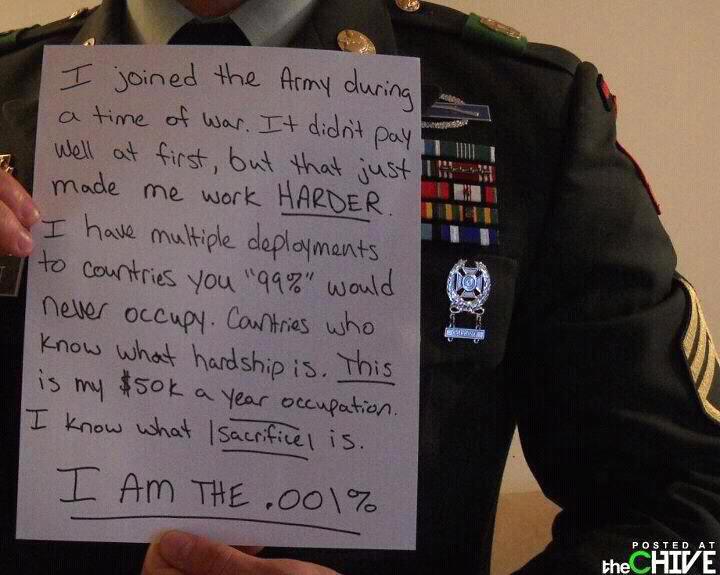Last week theChive posted a picture of an enlisted combat veteran in the U.S. Army holding up the anti-OWS sign below. Neglecting the fact that it is inappropriate to wear a military uniform while making political statements (not that this blogger can criticize too much), this image struck me as odd, even contradictory. Bear with me as I deconstruct this a bit, sentence by sentence, in a stream of consciousness. There are some interesting forces at play here.

"I joined the Army during a time of war."
Undoubtedly, this soldier is to be honored for his service, knowing full well that he would be deployed several times in a war that has lasted over a decade and stretched our forces thin. However, it would be naïve to think that the economy hasn't been a contributing factor to the military's recruitment success the past couple of years. In 2009, for example, the military met all of its recruitment goals for the first time in 35 years. Coincidentally, economists predicted that the 2009 economic crisis was to be the worst the world had seen in 60 years.
How much did the economy play into this young man's decision to join the military? Regardless of the answer, it doesn't take away from his bravery and his sacrifice, but if joining and maintaining our forces was purely a matter of public service, the need for sign-on bonuses, pensions, and benefits would be nonexistent.
"It didn't pay well at first, but that just made me work HARDER."
Promotion in the military is more or less a function of time, not talent. Tim Kane's article in The Atlantic discusses this at great length. John Nagl, a Rhodes Scholar, West Point graduate, tank-battalion operations officer, and one of the crafters of the Army's counterinsurgency manual, left the military without having achieved a full-bird (rank of Colonel).
If you're looking for a less extreme example, think about how common it is to congratulate a servicemember for being selected a year early for promotion. A year early? The promotion window is so specific that a year differentiates the absolute best soldiers at a certain rank from his or her average counterparts. Hard work in the military is even less determinant of income than in civil society.
"I have multiple deployments to countries you '99%' would never occupy."
I'm concerned with the fact that this soldier is voluntarily distinguishing himself from the 99 percent when middle-class Americans are disproportionately responsible for fighting and dying in today's wars. When is the last time a robber baron hung up his suit and tie and laced up his boots? Middle-class American soldiers are bearing the burden of these wars.
"Countries who know what hardship is."
I can only guess that the unidentified soldier is attempting to portray OWS protesters as ungrateful in comparison to people living in undeveloped countries. Sure, the average American enjoys a higher standard of living than Iraqi and Afghani people, but their message isn't directed internationally, or else they'd demand humanitarian intervention in these countries. Their focus in on the unequal distribution of wealth (read: distribution of power) in the United States, which is comparable to that seen in developing countries like Rwanda and Nepal in national rankings.
"This is my $50K a year occupation."
I find this statement rather confusing, as the servicemember is drawing attention to his modest income, yet he still seems to be directing his anger toward OWSers. Maybe he should take a look at this: the Pentagon's budget is being cut by $400 billion over the next 10 years, approximately the same amount taxpayers used to bail out banks in 2008. Theoretically, the money that could have been spent on national defense initiatives has been handed over to the 1 percent, which should resonate with military personnel. On top of that, the Armed Services are being downsized, and the coveted military pension program is under scrutiny. What's worse, a whopping 56 percent of our homeless populations are veterans!
"I am the .001%"
To be factually obnoxious, about 1 percent of the U.S. population is currently serving in the military.
I apologize for the rather incoherent presentation of my thoughts, but I think I've made clear the incoherence of this soldier's thoughts, as well, in doing so. Many of you may be wondering why this has a place in the Gay Voices section. Using this servicemember as example, I argue that the military has been a vehicle for conservatism, even when it doesn't make sense. ("Don't Ask, Don't Tell" anyone? The policy hurt our military, for Pete's sake, yet it stuck around for over 17 years.) What this veteran doesn't understand is that Occupy Wall Street is advocating on behalf of him; whether he chooses to recognize it or not, he's part of the same 99 percent he's criticizing. He spits out the "hard work" rhetoric Republicans notoriously abuse, as the conservative ideology must be so ingrained him that he doesn't even realize who benefits from this rhetoric. It's not him.